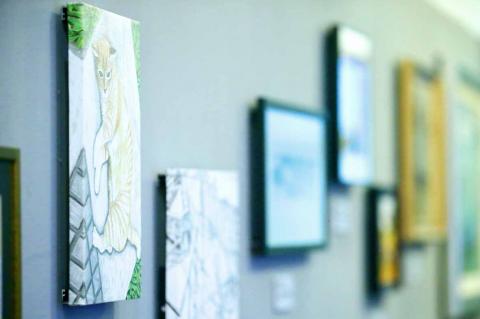The National Archives Administration has proposed an amendment to the Presidential and Vice Presidential Records and Artifacts Act (總統副總統文物管理條例) to clear out thousands of records and gifts taking up space in its warehouse.
Academia Historica, which is tasked with managing presidential and vice presidential records and artifacts, said it has drafted a revision to the act, which was promulgated in January 2004.
The proposed amendment, which is pending legislative review, stipulates that presidential and vice presidential gifts “be classified and then be written off from the inventory for disposal or given away to museums, other government agencies or charity organizations,” Academia Historica said.

Photo: CNA
The act stipulates that gifts worth more than NT$3,000 given to presidents and vice presidents during their tenures have to be turned over to the national archive.
There are more than 12,000 gifts in the archive’s storage, Academia Historica said.
Former president Ma Ying-jeou (馬英九) received about 6,000 gifts during his eight-year tenure from 2008 to last year, and his predecessor, Chen Shui-bian (陳水扁), received about 4,000 gifts, Academia Historica’s collection division chief Hsu Hsiu-jung (許秀容) said.
President Tsai Ing-wen (蔡英文) has received 117 gifts within 42 days of taking office on May 20 last year, Hsu added.
Items gifted to Tsai include a painting of an eagle named after herself and an air purifier for the cat-loving president, Hsu said.
Some of the gifts cannot be stored for long periods of time because they would decay, Hsu said, adding that in such a situation, the cost of preserving them would be higher than the benefit of keeping them.
For example, a leopard fur Ma received from Swaziland is beyond the institute’s professional ability to maintain for a long time, Hsu said.
There should be regulations that allow Academia Historica to determine whether presidential and vice presidential gifts are worthy of long-term storage, Hsu said.
If not, the national archive should have the right to dispose of them, she added.
The gifts are considered national property and cannot be sold, but can be given to museums for exhibition, to groups advocating socially disadvantaged people or to government agencies that might have use of them.
However, if seriously damaged, the items would be destroyed, Hsu said, referring to a clause in the proposed amendment.

Taiwan is stepping up plans to create self-sufficient supply chains for combat drones and increase foreign orders from the US to counter China’s numerical superiority, a defense official said on Saturday. Commenting on condition of anonymity, the official said the nation’s armed forces are in agreement with US Admiral Samuel Paparo’s assessment that Taiwan’s military must be prepared to turn the nation’s waters into a “hellscape” for the Chinese People’s Liberation Army (PLA). Paparo, the commander of the US Indo-Pacific Command, reiterated the concept during a Congressional hearing in Washington on Wednesday. He first coined the term in a security conference last

Prosecutors today declined to say who was questioned regarding alleged forgery on petitions to recall Democratic Progressive Party (DPP) legislators, after Chinese-language media earlier reported that members of the Chinese Nationalist Party (KMT) Youth League were brought in for questioning. The Ministry of Justice Investigation Bureau confirmed that two people had been questioned, but did not disclose any further information about the ongoing investigation. KMT Youth League members Lee Hsiao-liang (李孝亮) and Liu Szu-yin (劉思吟) — who are leading the effort to recall DPP caucus chief executive Rosalia Wu (吳思瑤) and Legislator Wu Pei-yi (吳沛憶) — both posted on Facebook saying: “I

Sung Chien-liang (宋建樑), who led efforts to recall Democratic Progressive Party (DPP) Legislator Lee Kun-cheng (李坤城), was released on bail of NT$80,000 today amid outcry over his decision to wear a Nazi armband to questioning the night before. Sung arrived at the New Taipei District Prosecutors’ Office for questioning in a recall petition forgery case last night wearing a red armband bearing a swastika, carrying a copy of Adolf Hitler’s Mein Kampf and giving a Nazi salute. Sung left the building at 1:15am without the armband and covering the book with his coat. Lee said today that this is a serious

A mountain blaze that broke out yesterday morning in Yangmingshan National Park was put out after five hours, following multi agency efforts involving dozens of fire trucks and helicopter water drops. The fire might have been sparked by an air quality sensor operated by the National Center for High-Performance Computing, one of the national-level laboratories under the National Applied Research Laboratories, Yangmingshan National Park Headquarters said. The Taipei City Fire Department said the fire, which broke out at about 11am yesterday near the mountainous Xiaoyoukeng (小油坑) Recreation Area was extinguished at 4:32pm. It had initially dispatched 72 personnel in four command vehicles, 16